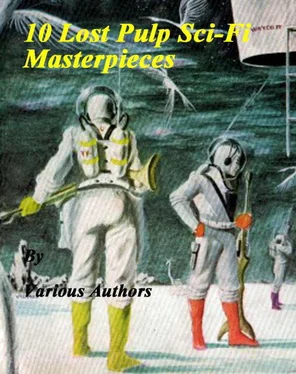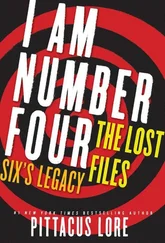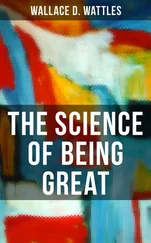F. Wallace - 10 Lost Pulp Sci-Fi Masterpieces
Здесь есть возможность читать онлайн «F. Wallace - 10 Lost Pulp Sci-Fi Masterpieces» весь текст электронной книги совершенно бесплатно (целиком полную версию без сокращений). В некоторых случаях можно слушать аудио, скачать через торрент в формате fb2 и присутствует краткое содержание. Город: Baltimore, Md., Год выпуска: 2010, Издательство: Publisher of One, Жанр: Фантастика и фэнтези, на английском языке. Описание произведения, (предисловие) а так же отзывы посетителей доступны на портале библиотеки ЛибКат.
- Название:10 Lost Pulp Sci-Fi Masterpieces
- Автор:
- Издательство:Publisher of One
- Жанр:
- Год:2010
- Город:Baltimore, Md.
- ISBN:нет данных
- Рейтинг книги:3 / 5. Голосов: 1
-
Избранное:Добавить в избранное
- Отзывы:
-
Ваша оценка:
- 60
- 1
- 2
- 3
- 4
- 5
10 Lost Pulp Sci-Fi Masterpieces: краткое содержание, описание и аннотация
Предлагаем к чтению аннотацию, описание, краткое содержание или предисловие (зависит от того, что написал сам автор книги «10 Lost Pulp Sci-Fi Masterpieces»). Если вы не нашли необходимую информацию о книге — напишите в комментариях, мы постараемся отыскать её.
Plus, classic, pulp illustrations of beautiful—dare I say it—buxom babes!
You will find these and more in this collection of lost, sci-fi pulp masterpieces.
10 Lost Pulp Sci-Fi Masterpieces — читать онлайн бесплатно полную книгу (весь текст) целиком
Ниже представлен текст книги, разбитый по страницам. Система сохранения места последней прочитанной страницы, позволяет с удобством читать онлайн бесплатно книгу «10 Lost Pulp Sci-Fi Masterpieces», без необходимости каждый раз заново искать на чём Вы остановились. Поставьте закладку, и сможете в любой момент перейти на страницу, на которой закончили чтение.
Интервал:
Закладка:
“We’d like to request,” he said, “that is—we think we ought to get together. We’d like you to call a meeting, Hockley. Some of us have a few things we’d like to talk over.”
Hockley nodded, his face impassive.
“The matter I mentioned to you the other night,” said Silvers. “It’s been happening to all the men. We think we ought to talk about it.”
“Fine,” said Hockley. “I’ve been thinking it would perhaps be a good idea. Pass the word around and let’s get some chairs. We can convene in ten minutes.”
The others nodded somberly and moved away with all the enthusiasm of preparing for a funeral. And maybe that’s what it would be, Hockley thought—somebody’s funeral. He hoped it would be the Rykes.
The room began filling almost at once, as if they had been expecting the call. In little more than five minutes it seemed that every member of the Earth delegation had assembled, leaving time to spare.
The senators still wore their looks of puzzlement and half-frightened anxiety, which had intensified if anything. There was no puzzlement on the faces of the scientists, however, only a set and determined expression that Hockley hardly dared interpret as meaning they had made up their minds. He had to have their verbal confirmation.
Informally, he thrust his hands in his pockets and sauntered to the front of the group.
“I have been asked to call a meeting,” he said, “by certain members of the group who have something on their minds. They seem to feel we’d all be interested in what is troubling them. Since I have nothing in particular to say I’m simply going to turn the floor over to those of you who have. Dr. Silvers first approached me to call this discussion, so I shall ask him to lead off. Will you come to the front, Dr. Silvers?”
The mathematician rose as if wishing someone else would do the talking. He stood at one side of the group, halfway to the rear. “I can do all right from here,” he said.
After a pause, as if coming to a momentous decision, he plunged into his complaint. “It appears that nearly all of us have encountered an aspect of the Ryke culture and character which was not anticipated when we first received their offer.” Briefly, he related the details of the Ryke rejection of his research on the Legrandian Equations.
“We were told we were going to have all our questions answered, that the Ryke’s science included all we could anticipate or hope to accomplish in the next few millenia. I swallowed that. We all did. It appears we were slightly in error. It begins to appear as if we are not going to find the intellectual paradise we anticipated.”
He smiled wryly. “I’m sure none of you is more ready than I to admit he has been a fool. It appears that paradise, so-called, consists merely of a few selected gems which the Rykes consider particularly valuable, while the rest of the field goes untouched.
“I want to offer public apologies to Dr. Hockley, who saw and understood the situation as it actually existed, while the rest of us had our heads in the clouds. Exactly how he knew, I’m not sure, but he did, and very brilliantly chose the only way possible to convince us that what he knew was correct.
“I suggest we do our packing tonight, gentlemen. Let us return at once to our laboratories and spend the rest of our lives in some degree of atonement for being such fools as to fall for the line the Rykes tried to sell us.”
Hockley’s eyes were on the senators. At first there were white faces filled with incredulity as the mathematician proceeded. Then slowly this changed to sheer horror.
When Silvers finished, there was immediate bedlam. There was a clamor of voices from the scientists, most of whom seemed to be trying to affirm Silvers’ position. This was offset by explosions of rage from the senatorial members of the group.
Hockley let it go, not even raising his hands for order until finally the racket died of its own accord as the eyes of the delegates came to rest upon him.
And then, before he could speak, Markham was on his feet. “This is absolutely moral treachery,” he thundered. “I have never heard a more vicious revocation of a pledged word than I have heard this evening.
“You men are not alone concerned in this matter. For all practical purposes you are not concerned at all! And yet to take it upon yourselves to pass judgment in a matter that is the affair of the entire population of Earth—out of nothing more than sheer spite because the Rykes refuse recognition of your own childish projects! I have never heard a more incredible and infantile performance than you supposedly mature gentlemen of science are expressing this evening.”
He glared defiantly at Hockley, who was again the center of attention moving carelessly to the center of the stage. “Anybody want to try to answer the Senator?” he asked casually.
Instantly, a score of men were on their feet, speaking simultaneously. They stopped abruptly, looking deferentially to their neighbors and at Hockley, inviting him to choose one of them to be spokesman.
“Maybe I ought to answer him myself,” said Hockley, “since I predicted that this would occur, and that we ought to make a trial run before turning our collective gray matter over to the Rykes.”
A chorus of approval and nodding heads gave him the go ahead.
“The Senator is quite right in saying that we few are not alone in our concern in this matter,” he said. “But the Senator intends to imply a major difference between us scientists and the rest of mankind. This is his error.
“Every member of Mankind who is concerned about the Universe in which he lives, is a scientist. You need to understand what a scientist is—and you can say no more than that he is a human being trying to solve the problem of understanding his Universe, immediate or remote. He is concerned about the inanimate worlds, his own personality, his fellow men—and the interweaving relationships among all these factors. We professional scientists are no strange species, alien to our race. Our only difference is perhaps that we undertake more problems than does the average of our fellow men, and of a more complex kind. That is all.
“The essence of our science is a relentless personal yearning to know and understand the Universe. And in that, the scientist must not be forbidden to ask whatever question occurs to him. The moment we put any restraint upon our fields of inquiry, or set bounds to the realms of our mental aspirations, our science ceases to exist and becomes a mere opportunist technology.”
Markham stood up, his face red with exasperation and rage. “No one is trying to limit you! Why is that so unfathomable to your minds? You are being offered a boundless expanse, and you continue to make inane complaints of limitations. The Rykes have been over all the territory you insist on exploring. They can tell you the number of pretty pebbles and empty shells that lie there. You are like children insistent upon exploring every shadowy corner and peering behind every useless bush on a walk through the forest.
“Such is to be expected of a child, but not of an adult, who is capable of taking the word of one who has been there before!”
“There are two things wrong with your argument,” said Hockley. “First of all, there is no essential difference between the learning of a child who must indeed explore the dark corners and strange growths by which he passes—there is no difference between this and the probing of the scientist, who must explore the Universe with his own senses and with his own instruments, without taking another’s word that there is nothing there worth seeing.
“Secondly, the Rykes themselves are badly in error in asserting that they have been along the way ahead of us. They have not. In all their fields of science they have limited themselves badly to one narrow field of probability. They have taken a narrow path stretching between magnificent vistas on either side of them, and have deliberately ignored all that was beyond the path and on the inviting side trails.”
Читать дальшеИнтервал:
Закладка:
Похожие книги на «10 Lost Pulp Sci-Fi Masterpieces»
Представляем Вашему вниманию похожие книги на «10 Lost Pulp Sci-Fi Masterpieces» списком для выбора. Мы отобрали схожую по названию и смыслу литературу в надежде предоставить читателям больше вариантов отыскать новые, интересные, ещё непрочитанные произведения.
Обсуждение, отзывы о книге «10 Lost Pulp Sci-Fi Masterpieces» и просто собственные мнения читателей. Оставьте ваши комментарии, напишите, что Вы думаете о произведении, его смысле или главных героях. Укажите что конкретно понравилось, а что нет, и почему Вы так считаете.












